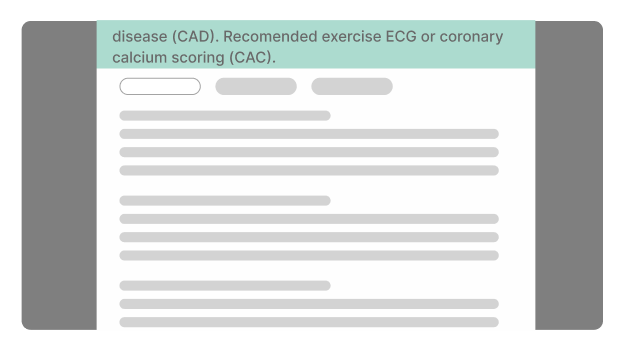Clinicians are consistently practicing evidence-based medicine
Infera is an advanced clinical decision support system (CDSS) that seamlessly integrates with your EHR and the clinician work-flow. It provides clinicians with peer-reviewed, evidence-based, clinical recommendations in real-time by analyzing the patient’s EHR data. Infera is a HIPAA compliant and secure solution.
Infera can help you test your clinical knowledge by providing patient case scenarios that help advance your clinical skills.
Request a demo
We developed Infera to help clinicians provide better care for their patients. But because healthcare is incredibly complex, we designed Infera to address the needs of and challenges faced by group medical practices, hospitals and health systems in particular.
Claims files are uploaded into Claims Assistant via a web interface, after which the data is mapped by our team in a one-time process. With a few clicks, claims are extracted and intelligent rules are applied to the data. Within seconds the output is displayed in an easy to read format. Output can be filtered in multiple ways and maybe be printed or exported to a spreadsheet.
Clinicians are consistently practicing evidence-based medicine
Diagnosis and treatment are patient-centric, rather than condition-centric
PCPs are able to better manage patients, reducing costly specialist referrals
Patient management
is based on the latest clinical guidelines and peer-reviewed articles
Patient care meets critical (and changing) quality criteria for reimbursement

Group Medical Practices (GMP) today face more challenges than ever which can tax clinicians, and smaller office staffs. Clinicians in GMPs naturally want to strive to improve the quality of patient care while doing their part to reduce healthcare costs. But these challenges are exacerbated by increasing caseloads, the continuing growth of Accountable Care Organizations (ACOs) and reimbursement tide to incentives (and punishments) of healthcare regulations like MIPS (Merit-based Incentive Payment System).
Infera is uniquely positioned to help GMPs by helping primary care physicians practice evidence based medicine, which can help maximize reimbursement, and deal with complex cases themselves, without the need for expensive and time-consuming specialty care.

Hospital and health system executives and clinical leadership face immense challenges when it comes to ensuring quality, consistency, accountability and efficiency. These challenges are exacerbated as a result of having hundreds (if not thousands) of clinicians who are often dispersed across multiple locations.
EMRs and clinical management software, though often maligned by clinicians, are a critical part of the solution, but they have their limitations. While EMRs excel at centralizing patient data and enabling workflow tasks, they don’t provide the kind of clinical knowledge and data interpretation assistance clinicians often need to better manage patients.
This often leads to costly and time-consuming specialist referrals, sub-optimal patient care and incomplete reimbursement, but can also create risk for organizations.

Individual physicians, face most of the challenges of GMPs, but they also know that one of the biggest challenges they face is staying up to date on the latest treatment guidelines and clinical research.
Infera is available as a stand-alone solution for data input, enabling individual physicians and small practices not using EHRS to take advantage of Infera’s powerful features.
Multiple scenarios can be generated with our Clinical Rules Engine for over 90 conditions, or “Care Pathways” which help evaluate your skills and give you guidance on the most current evidence-based patient care.
Infera can help you test your clinical knowledge by providing patient case scenarios that help advance your clinical skills.
Diagnostic
considerations
Treatment plan including medications
Standard of care to follo
for prevention
of complications
Lifestyle
modifications
Follow up and monitoring plan

Infera is embedded within your EHR. When a clinician initiates Infera, it instantly the reads structured and unstructured data in the patient’s charts/record. This enables a truly comprehensive analysis of the patient chart. Recommendations are delivered within the EHR in the form of a fully referenced report.
Infera is a scalable solution, delivered as a service (SaaS) so there’s no hardware or software for you to install, maintain or update. Updates, including new care pathways, are made continually and automatically. Administrators and users receive notifications via Infera’s Message Board.
Organizations using EHRs from Allscripts and athenahealth can add Infera through their marketplaces/application stores. We work closely with organizations who are using other EHRs to plan and execute implementation

Infera is comprehensive, featuring over 90 specialist-reviewed care pathways. By parsing structured data from the continuity of care document (CCD) and analyzing unstructured data found in the clinical note using natural language processing, Infera captures comprehensive data about the patient’s condition. We know that speed is an essential component of utility, so Infera’s Clinical Rules Engine is fast, returning recommendations in a matter of seconds.
By parsing structured data from the continuity of care document (CCD) and analyzing unstructured data found in the clinical note using natural language processing, Infera captures comprehensive data about the patient’s condition. We know that speed is an essential component of utility, so Infera’s Clinical Rules Engine is fast, returning recommendations in a matter of seconds.
Infera’s care pathway families include:

Infera’s Custom Pathway Builder enables organizations to leverage the care standards and treatment guidelines they’ve developed to further standardize treatment across their network. Care Pathway Builder is an easy-to-learn, intuitive, decision-tree based authoring system that supports full annotation.
They utilize the latest clinical guidelines and peer-reviewed literature to develop and update Infera’s more than 90 care pathways.
Sources include: